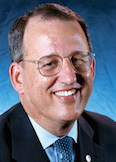Adding to the Woodpile
Posted on March 10, 2010On the occasion of becoming the UNC System’s fourth president, Erskine Bowles ’67 recounted in an interview for the January/February 2006 Carolina Alumni Review that his father, Hargrove “Skipper” Bowles ’41, in accepting a major award, once said: “I want you to judge me based on what my children do for others.” Bowles went on to note that his father recalled that “in the old days in the South, everybody’d go out and chop some wood for their own family to keep the home fires burning, but they’d throw a few logs on the woodpile for the community. And he said we all had a responsibility to do that.”

Doug Dibbert ’70
In 2005, the search committee for the next system president developed an ambitious “presidential leadership statement” that affirmed that, to achieve the goals identified as priorities, the new president must “be a person of integrity; be trustworthy; be energetic, tenacious and dynamic; be stable, optimistic and poised; value the life of the mind; be passionate about higher education; be comfortable with complexity and diversity; be open-minded and a good listener; appreciate the value of a broad range of individuals; be an effective and persuasive communicator; and have a sense of humor.”
There is little doubt that Erskine Bowles has met and exceeded those appropriately lofty standards. In that same 2006 interview with the Review, titled “His Dream Job,” Bowles said: “I know how to manage and how to … manage something big. … I know how to manage in a public environment. … I’ve had experience dealing with legislators. … I’ve had lots of experience working with people on both sides of the aisle. … I have an enormous appreciation for the value this University plays. … I’ve gotten to know North Carolina in a lot of different ways.” Those ways include being a native North Carolinian, a student and a businessman; a volunteer working with the juvenile diabetes foundation, the Duke Endowment and the Carolinas Medical Center; and a federal official, the head of a rural prosperity task force and a candidate for public office.
Many observed that, from the beginning, Erskine Bowles was bigger than the job.
Historians will determine Bowles’ most significant and lasting achievements. Certainly, the list will include his persistent focus on tightening business practices on campuses and at UNC General Administration; selecting able, dynamic chancellors at our campus as well as Elizabeth City State, Fayetteville State, N.C. A&T State, N.C. Central, N.C. State, UNC-Greensboro, UNC-Pembroke, the School of the Arts and Winston-Salem State; fostering increasing collaboration among the campuses; partnering with the community college and public school systems; launching UNC Tomorrow and insisting that campuses become more “demand driven”; and relentlessly cultivating and strengthening relationships with the N.C. General Assembly.
Under the leadership of UNC System Board of Governors Chair Hannah Gage ’75, the new presidential search committee will review the challenges that will face the new president. A clear consensus on the qualities and qualifications is important prior to any serious discussion of individual candidates. Too often, searches immediately focus on those who have expressed an interest or those identified by others before fully studying the requirements of the job and the qualities and experiences that should be sought.
The search committee may benefit from recalling that several years ago Stephen Portch, then president of the University System of Georgia, began a keynote speech: “Every morning, I remind myself that I really don’t exist. A system has no students, no faculty and no alumni.” Another new Midwestern system president once said he found that that system was “running too many things that should be done on the campuses.” He noted that the primary functions of systems are to develop and advocate for budgets, review and approve new degree programs, and select and evaluate campus CEOs. He believed that anything else distracted systems from being effective in achieving their primary functions.
In the 1971 session of the N.C. General Assembly, I had the honor of working as Skipper Bowles’ administrative assistant, meeting Erskine and attending Crandall’s and Erskine’s wedding. That Skipper and Erskine had a special relationship was obvious to all; they shared many things, including, most especially, a passion for Carolina basketball. It has surprised no one that Erskine has declined to sit in seats traditionally reserved for the UNC System president, preferring to sit in “my daddy’s seats.” When Erskine learned that I was preparing this column, he sent the following e-mail. It seems appropriate that he should have the last words, for he most certainly has added to the community woodpile through his leadership and service:
I’m the son.The good I have tried to do is a reflection of the values instilled in my sisters, brother and me from day one. It’s your old friend you should write about. He is the one who motivated the likes of Doug Dibbert,Tom Lambeth, Joel Fleishman, Thad Woodard, James Lee Burney, Jim Newlin, Jill Gammon, Durwood Stephenson, Bishop George Battle, Jim and Marsha Van Hecke, and, yes, his children and countless others to do their part to “add to the woodpile.”We, in turn, will be judged by those in the next generation that we influence to “do their part to make this world a better place.” And, yes, for sure, I am and always will be a Tar Heel! — Erskine
Yours at Carolina,

Douglas S. Dibbert ’70
